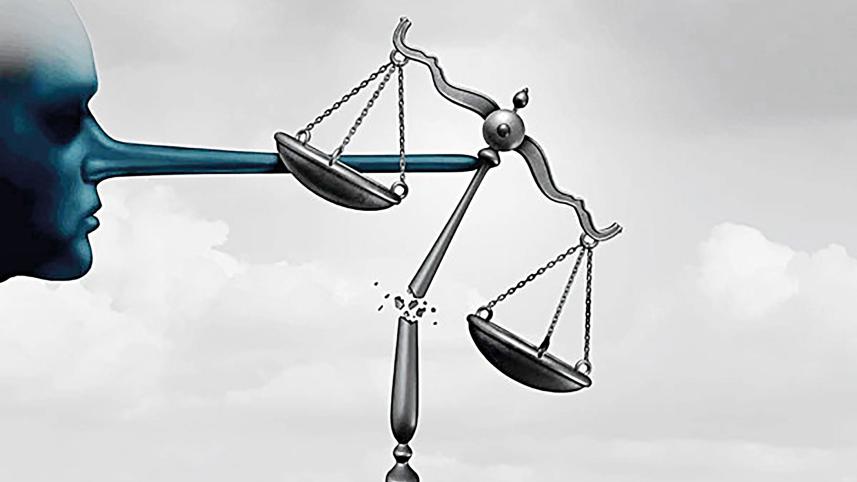The enduring crisis of administrative corruption

One of the enduring maledictions that plagues Bangladesh is bribery and corruption, which is prevalent across sectors, including our judiciary. Reform proposals on the independence of judiciary, or a separate secretariat of the judiciary are certainly promising. However, even if the proposals are materialised, we will not be able to reap the benefit of their implementation, if the problem of corruption is not dealt with first. This is because corruption poses a significant barrier to rendering true justice to litigants. A survey conducted by the Transparency International Bangladesh (TIB) released on 3 December 2024 revealed that 62.3% of surveyed households had become victims of corruption while seeking judicial services. Usually, the litigants seeking judicial service cannot have direct access to the judges of a court. Here, the administrative officers of a court i.e., bench officers, staff, and clerks often stand in the way of justice.
While judges play the central role in delivering justice, court staff - including clerks, bailiffs, typists, record-keepers, and other administrative personnel- also hold significant influence over the judicial process. Law practitioners are often inclined to seek dates of their hearing at their convenience from a peshkar (court clerk) or bench officer. Though the duty of fixing a date for the hearing is theoretically upon the judges, practically, such is carried out by the staff. Corruption occurs when the court staff intentionally delay hearings or final decisions in a case. The delay in such cases often occurs due largely to benefit one party, allowing them time to manipulate the situation. Such practice can be widely noticed in almost every district court, even at the higher judiciary.
Record manipulation (tampering with or losing case documents) holds a significant place in the sphere of administrative corruption. In this form of corruption, important case documents get intentionally misplaced, altered, or destroyed from the court offices. One news report from January 2025 by the Daily Prothom Alo found that Case Dockets (CDs) of 1,911 cases from the Chattogram court are missing. This is just one example of many such incidents.
One of the least discussed yet critical areas of corruption within the judicial system involves the issuance of summons. The summons issuers, entrusted with delivering court summons and notices, often engage in corrupt practices that obstruct dispensation of justice. Instances include deliberately delaying the delivery of summons, falsely reporting that the concerned party could not be located, or demanding unofficial payments to fulfil their regular duties. In some cases, they collude with litigating parties to manipulate service records, thereby causing undue delays or ex parte proceedings.
However, the recent 2025 amendment to the Code of Civil Procedure (CPC) seeks to address this issue by introducing a more efficient and transparent mechanism for the service of summons. Under the amended provisions, summons may now be served through electronic means such as Short Message Service (SMS) and telephone calls. This reform aims to reduce the chances of manipulations, minimise delays, and ensure greater accountability in the service process.
Notwithstanding the major reform proposals suggested by the Judicial Reform Commission, without uprooting the structure of administrative corruption, a judiciary embodying the aspirations of the July uprising may never dawn. To effectively address administrative corruption within the judiciary, a multifaceted reform strategy is needed. A well-calibrated system of incentives, both positive (adequate remuneration, career progression, and conducive working conditions) and negative (proportionate and enforceable sanctions), should be institutionalised to deter corrupt practices. Moreover, regular and focused capability strengthening initiatives must be introduced to aggrandise the administrative competence of court personnel, having recourse to international best practices.
The integrity and accountability of court operations further depend on the conduct of presiding officers; thus, having strict and principled judges who apply both corrective and developmental disciplinary measures is critical. Additionally, performance evaluation mechanisms, particularly Annual Confidential Reports require reform to ensure objectivity, transparency, and protection against misuse by senior officers. Finally, fostering a professional yet collaborative working relationship between judges and court staff can promote institutional cohesion while upholding ethical standards, especially for newly appointed judges navigating the court system.
The writer is law graduate from the Department of Law, University of Dhaka.
 For all latest news, follow The Daily Star's Google News channel.
For all latest news, follow The Daily Star's Google News channel.
Comments